
試想像你在跟朋友喝茶聊天,房間裡有一頭大象,大得把房間的一半都擠滿了。但是你的朋友好像完全沒留意到,跟平時一樣悠然自得的樣子。這時候,你會不會跟他講房間裡有隻大象?
Who says English books are boring?

試想像你在跟朋友喝茶聊天,房間裡有一頭大象,大得把房間的一半都擠滿了。但是你的朋友好像完全沒留意到,跟平時一樣悠然自得的樣子。這時候,你會不會跟他講房間裡有隻大象?
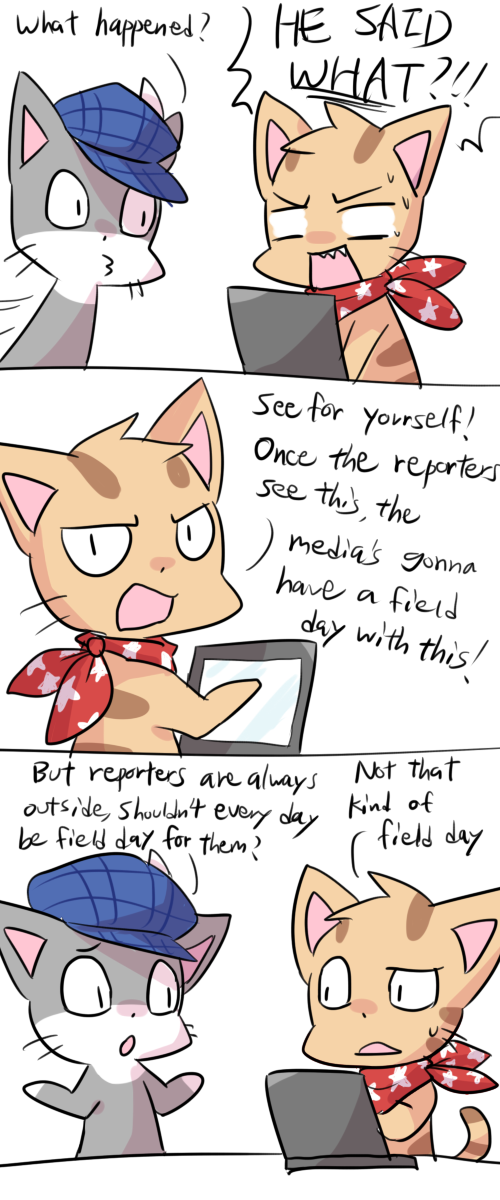
還記得在學校的時光嗎?雖然上學可以看到同學跟好碰友,但是一直都要在課室中龜著也是挺無聊的啊~難怪小息鐘聲開始響起來的時候,小朋友們都會一窩蜂跑出來,操場上充滿著嬉笑的聲音。當然啦,郊遊日才是大家期待的活動,一整天不用上課可以在郊外遊戲超爽的!
這種郊遊日在英文稱作field day,所以having a field day可以理解為很爽,很快活的感覺
但是這種說法可是有另外一個意思。有些人很喜歡對其他人冷嘲熱諷,別人犯了錯說錯話對他們來說就好像天降下來的禮物,當然要好好利用,挖苦一番。要形容這種行為,也可以用having a field day,可是這次的快樂可是帶著惡意的
雖然條漫中只是字面上的梗,對媒體來說可能真的每天都有新材料,每天都是field day呢
Still remember your days at school? Even though you get to see your friends and classmates at school, it does get boring when you’re stuck in a classroom every day…No wonder whenever break time comes around and the bells start ringing, kids start pouring out and the everywhere on the playground is the sound of laughter. Of course, what everybody look forward to is school trips – nothing beats spending a whole day outside school, having fun instead of being in class!
These days are also known as field days, therefore “having a field day" means being overjoyed and excited.
However there is more to this phrase than that. Some people love to insult and make fun of others. Something like people making mistakes and letting slip the wrong words is practically a gift from heaven, a gift that they would happily grab hold on with a barbed tongue. These people are said to be having a field day as well, although this kind of happiness is built on malice.
While the comic is nothing more than a word pun, perhaps to the media, everyday is indeed a field day to them.
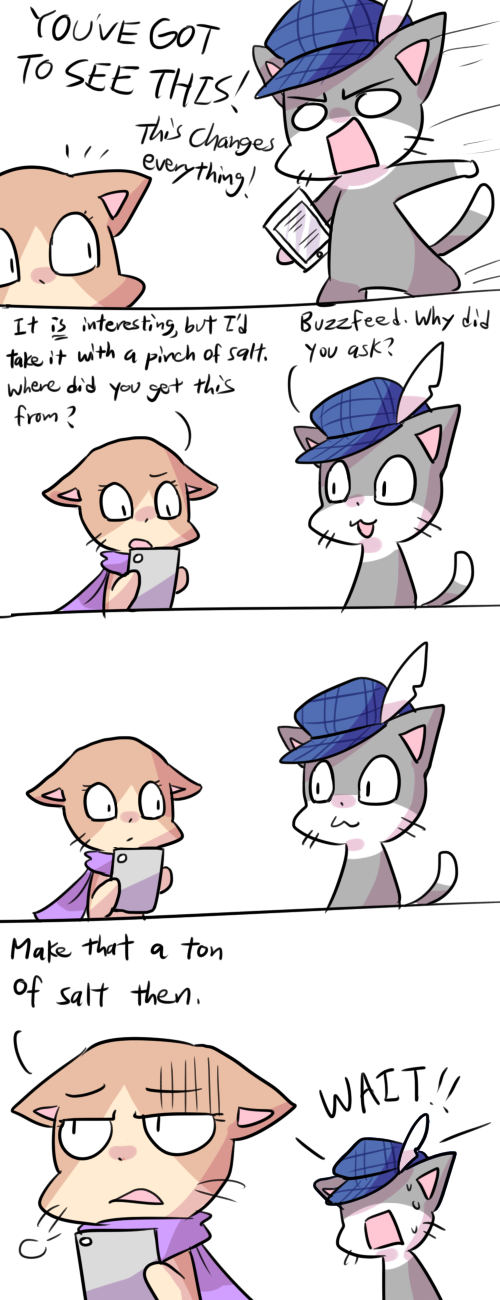
隨著網路愈來愈發達,有不少人會視網路媒體為新聞來源之一。然而網上資訊難分真假,有很多內容農場會隨便亂寫務求成功騙來一堆點擊率。所以我們看到網上的消息不可以胡亂相信,總要抱一點懷疑的態度才行。
這樣的想法,就是要"Take it with a pinch of salt"了!
(話說這是英國人的說法,美國人會用"a grain of salt"但是意思也是一樣的喔)
那麼這語句的來源是什麼呢?相傳古羅馬時期的一位著名學者Pliny曾經在書中介紹一種解毒劑,這種解毒劑要跟鹽一起服用才會有效,所以吃一點鹽就有解毒的意思。
類似的說法就是有一位古羅馬軍官很害怕被下毒,於是決定以毒攻毒,自己先嘗過不同種類的毒讓身體懂得應對,而他會把毒連同一點鹽服用,因為他認為這樣好像比較容易入口。
同樣道理,對聽回來的事情有所保留,就好像吃點鹽防止中毒吧?
但是也有人認為事情才沒那麼複雜,只是拉丁文中鹽跟幽默感是同一個字,所以"a grain of salt"應該是譯成"a grain of wit"才對
好啦,要不要把這篇文跟一點鹽吃下去就看你囉
As the Internet continues to develop, more and more people are relying on online media as their source of news. However, it is difficult to tell real and fake news on the Internet apart, and many clickbait websites would happily cobble together articles in a rush to fish for clicks. Therefore, we shouldn’t blindly believe everything we read on the Internet, instead we should at least be a little skeptical about it.
In other words, we should take it with a pinch of salt!
(by the way, this is the British version of the saying. The Americans use “a grain of salt", but the meaning still stands)
So where did this idiom come from? Back in the Roman empire, a famous scholar, Pliny, once wrote in a book a reciepe for an antidote. This antidote had to be taken with some salt in order to work, and so eating a bit of salt also means taking an antidote.
A similar theory is that a Roman general was terrified of being poisoned, so he decided to fight fire with fire, and started taking different poisons in small amounts to help his body tackle them. He often took the poison with some salt, since he believed that it could make the poison easier to swallow.
Perhaps being skeptical about rumours is just like taking some salt to prevent yourself from being poisoned, eh?
Yet some people argued that things aren’t really that complicated, it’s just because “salt" and “wit" have the same word in latin, therefore “a grain of salt" should be translated as “a grain of wit" instead.
Ah well, whether to take this article with a pinch of salt is entirely up to you
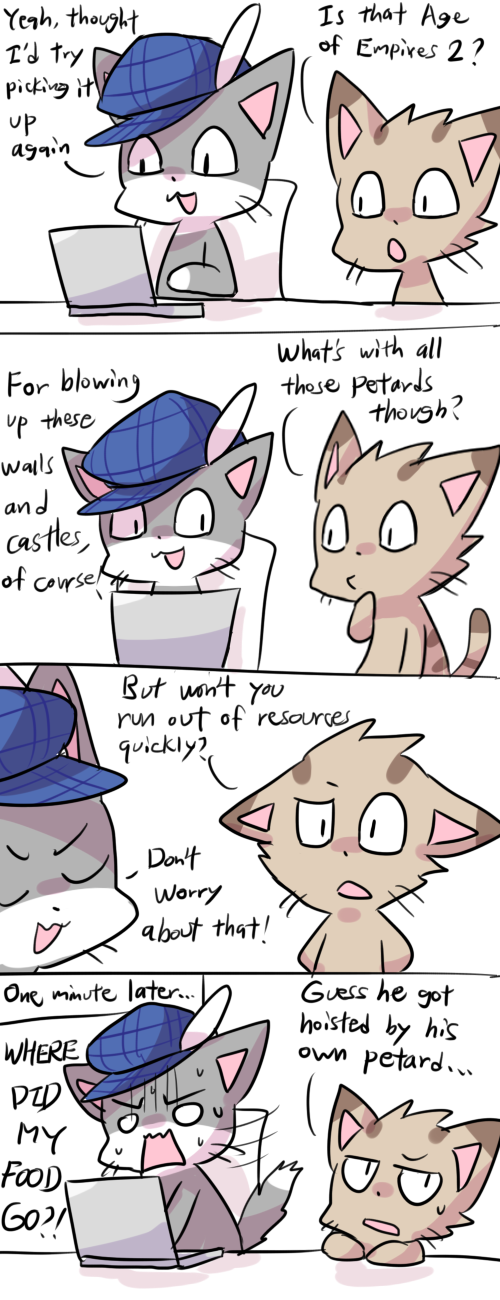
對於不少經歷過網咖年代的人來說,世紀帝國II算是一個當年的回憶了吧?然而除了Wololo之類的梗之外,這遊戲也會有一些跟中世紀有關的小知識喔~
先說說Petard吧!中世紀時期,堅固的城堡可以說是君主最好的保護之一,畢竟當時的攻城武器不算十分強,只要有足夠資源,敵人攻城時龜在城堡裡面跟他們周旋到底也是一種選擇。
然而火藥從中國傳到西方的時候,一切都改變了,西方進入熱兵器年代。除了可以用炮彈轟炸城牆,當然也可以用炸藥直接把城牆炸掉。但是當年沒有什麼計時炸彈,那應該怎樣把炸藥放在城牆下呢?結果就是找人拿著名叫Petard的火藥包跑到城牆旁,把火藥安好之後點燃,然後趕快跑開!可是這工作十分危險,不小心的話炸到的不是城牆而是自己。
“Hoisted by one’s own petard"就是用來形容一個人踩進了自己弄的陷阱,就好像被自己帶著的Petard炸傷那樣。順帶一提,這個說法的來源是沙士比亞的哈姆雷特,但是原作中寫的是"Hoisted with one’s own petard",不知道為什麼現在反而變成"Hoisted by“…
至於圖中的梗嘛,生產Petard挺花資源的呢
To a lot of people who lived through the Internet Bar era, Age of Empires 2 should be a pretty fond memory right? Turns out this game brings not only classic in-jokes like “wololo", but also some interesting tibits about the Middle Ages!
To start with let’s talk about petards! In the Middle Ages, a sturdy castle was one of the best defences any ruler worth their salt could ask for. Since siege weapons weren’t very effective back then, given enough resources it was possible to bunker up inside your castle and bear it out during a siege.
However, everything changed when gunpowder was introduced to the west, kick-starting the “hot weapons" era. Aside from using ballistas to break the walls, you can obviously use gunpowder to directly blow them up as well. There’s a problem though. Time bombs did not exist back then, so how could people get those gunpowder where they should be? In the end, some soldiers had to carry “petards" full of gunpowder to the walls, attach and light the petards, then get out of there right away! However, this is a very dangerous task. If they weren’t careful enough, they might end up blowing themselves up instead of the walls.
Therefore, “Hoisted by one’s own petard" is used to describe people falling into their own trap, as if they were blown up by their own petards. By the way, this idiom originated from Shakespeare’s Hamlet, yet in the original play it was written as “Hoisted with one’s own petard". For some reason, people ended up remembering it as “Hoisted by one’s own petard"…
As for the in-joke in this comic? Well, it’s quite expensive to make petards in the game, after all.
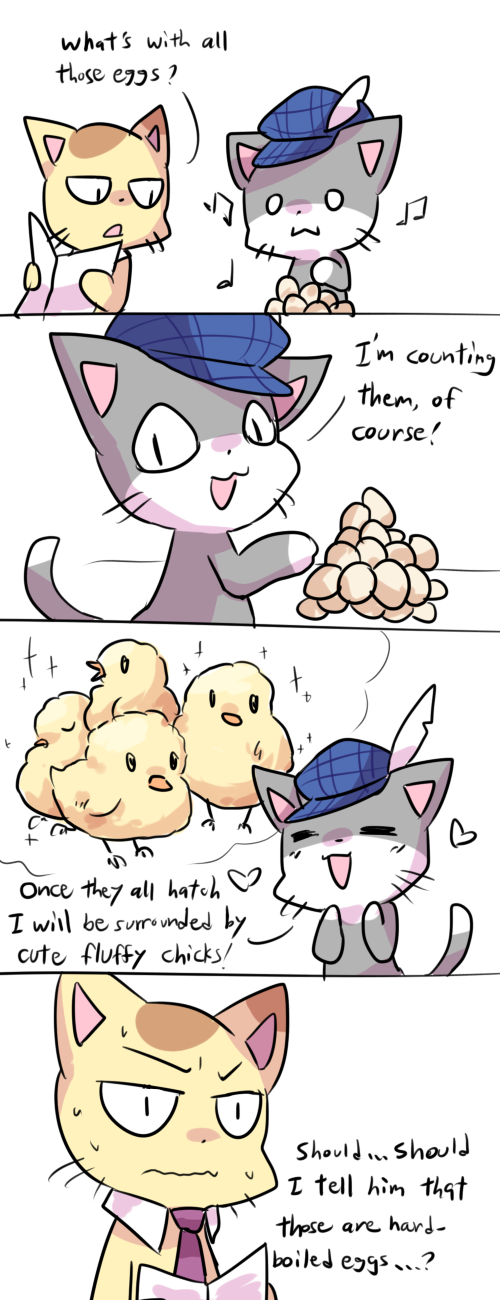
不知道大家有看過小雞沒有?印象中香港科學館曾經有展示孵蛋器,還可以看到一堆圓滾滾可愛的小雞喔!對有養小雞的人來說,期待小雞破殼而出的一刻這種心情果然是最棒的啦!
但是手上的一堆蛋不一定會全部化為小雞,總會有一些失敗作的啊…也許是弄破了,也有可能裡面根本就沒有小雞,所以要知道會有多少雞蛋成功孵化,總不能一開始便在數吧!(好啦現今科技可能有方法預先知道,但是當年可不是這回事啦)
就如足球是圓的,一場足球賽不到最後一刻根本不會知道結果,這時候假設事情一定會怎樣也是言之過早呢~Don’t count your chickens before they hatch就是這個意思。當然啦,對事情有所期望是很正常的,只是有時候不用太執著於期望的結果啦!
不過也有些事情根本就不會容許有別的結果,這時候數不數雞蛋也沒什麼意義了呢。
Have you ever seen a baby chick? If I remembered correctly, the Hong Kong Science Museum once displayed an incubator for eggs, and we had the chance to see a bunch of round fluffy chicks! As for those who have raised chicks before, nothing felt better than the anticipation as they waited for the chicks to hatch!
However, not all eggs have a chance to hatch, there’s bound to be some duds…perhaps they broke before they hatched, maybe some don’t even have chicks in them in the first place. Therefore, if you want to know how many eggs will get to hatch, you can’t start counting right away! (Sure technology may have given us a way to predict this, but back then no such thing exists)
As the saying goes, a football is round, and there is no knowing how a match will play out until it’s all over. In such case it’s simply too early to jump into conclusions about how things should have happened, which is exactly what “Don’t count your chickens before they hatch" means. Of course it’s perfectly normal to have expectations, it’s just that don’t be too caught up in whether things will happen exactly how you wanted it to.
But then sometimes a different outcome isn’t even allowed at all, by then there’s no point in arguing whether to count your chickens or not I suppose.
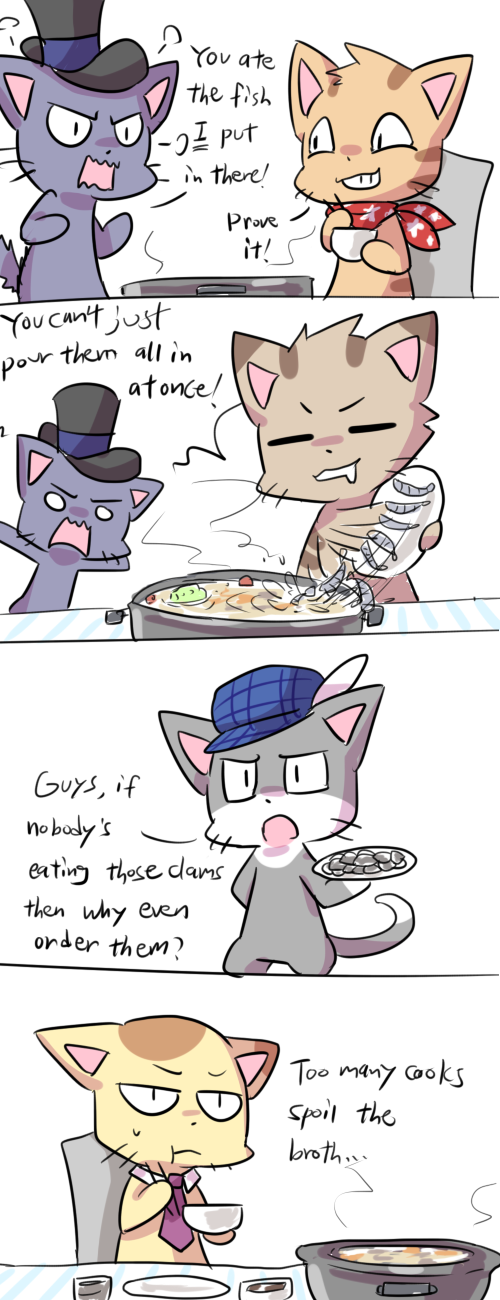
俗語說人多好辦事,大家都會認為團體合作比一個人單打獨鬥來得有效率,但是是不是人多就一定好辦事呢?
有時候如果很多人同時在搞一件事但是沒有好好互相溝通協調的話,反而很容易會因為大家的進度不同而弄得手忙腳亂。就好像很多個廚師在弄一道菜,就算他們廚藝有多強也可能會把一整鍋湯的味道搞垮喔~
這裡我用了火鍋當例子,相信大家也試過揪團吃火鍋時因為朋友亂加食物而弄出好像黑暗料理般的物體吧?英文俗語Too many cooks spoil the broth就是用來描述這種情況啦!
As the saying goes “many hands make light work", so we tend to think working together as a group is more efficient than struggling alone, but does many hands always make light work?
Sometimes when a lot of people are working on the same thing but without proper communication nor synergy, it’s actually very easy to get tangled up as people make different progress. It’s like how when a lot of cooks prepare a dish together, even if they’re master chefs it’s still possible to mess up the broth’s flavour~
Here I used hotpot as an example. Have you ever had hotpot together, but your friends kept adding so much food you ended up with a culinary disaster? The saying “Too many cooks spoil the broth" is what you’d use to describe this!
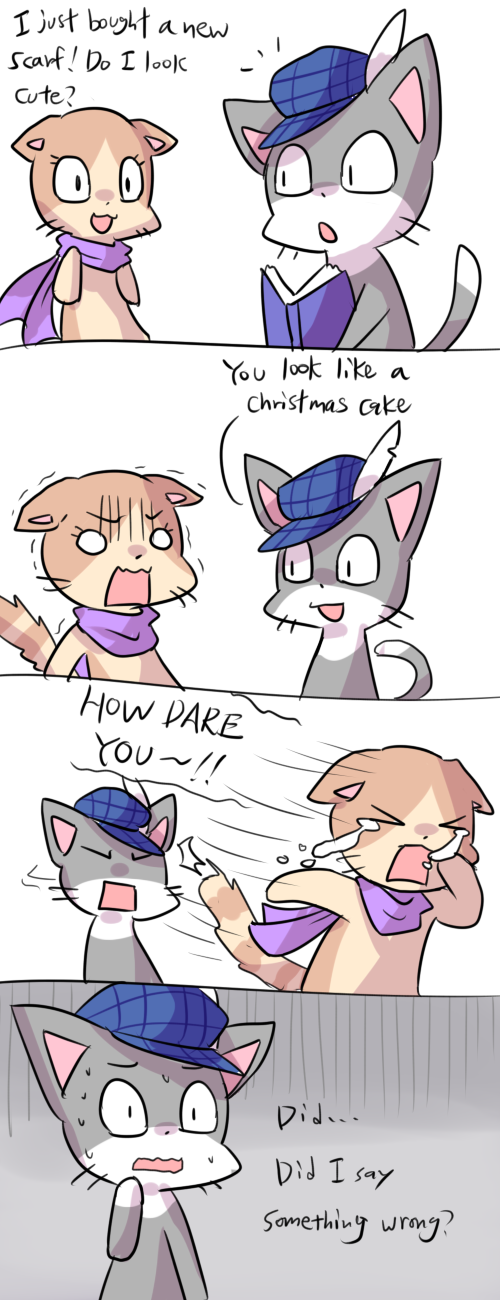
既然最近是聖誕節,就來談談跟這個節慶有關的事情吧!
雖然聖誕蛋糕Christmas Cake聽起來不是什麼壞東西,但是這個字對著女生講可是大忌呢~
那為什麼呢?原來是日本幹的好事!現在不同國家的聖誕節都很商業化,日本當然也不例外,而聖誕蛋糕是很好的例子。(畢竟當年的日本很崇洋,能夠吃到聖誕蛋糕的人自然也是潮到出水了吧)現在日本的餅店都會在聖誕節期間推出精緻的聖誕蛋糕,務求在節日氣氛中大賺一筆。
但是聖誕節終會過去,那麼賣不出去的蛋糕怎麼辦?既然聖誕節已經過去了,那還吃什麼聖誕蛋糕呢?結果這些蛋糕就沒人要了….
於是乎,Christmas Cake這個字就被用來形容一些到了一定年齡還是沒有男朋友,嫁不出去的女生,大概就是取笑他們過了食用時間所以沒人要。呃,還真過份的啊。
不過隨著社會改變,結不結婚這些問題女生們都能夠自己決定,選擇晚點結婚或者索性維持單身也沒什麼大不了的。希望Christmas Cake這個字給人的印象不再是安在女性身上的嘲諷,而是帶來快樂跟溫暖的食物吧!
Since it’s Christmas these days, let’s talk about something seasonal then!
Although Christmas cakes don’t sound half bad, but it’s actually taboo to call a girl like that.
But why? Turns out it’s all Japan’s doing! Nowadays, Christmas is pretty commercialized in many countries, and Japan is no exception. Christmas cakes are one good example. (After all, back in the day the Japanese looked up to the West, and being able to have Christmas cake meant being the trendiest guy in town) And so these days, bakeries in Japan rush to make fancy Christmas cakes, in a bet to get the money rolling in during the holiday cheer
.
Christmas will eventually come and go, but what about the remaining cakes? Since the season is over, what’s the point of having Christmas cake? As a result, those cakes end up being forgotten and left to rot…
And so, the slang Christmas cake is used to describe women at a certain age who are still single and unmarried. Simply put, they are mocked for being past their “expiry date" and dumped by others. Er…that does sound rather uncalled for.
However, as society continues to change, women began to have their say in marriage, and choosing to marry later or to stay single altogether is nothing special. Let’s hope that in the future, Christmas cakes will remind people of food that brings warmth and happiness, and not mockery placed on women!
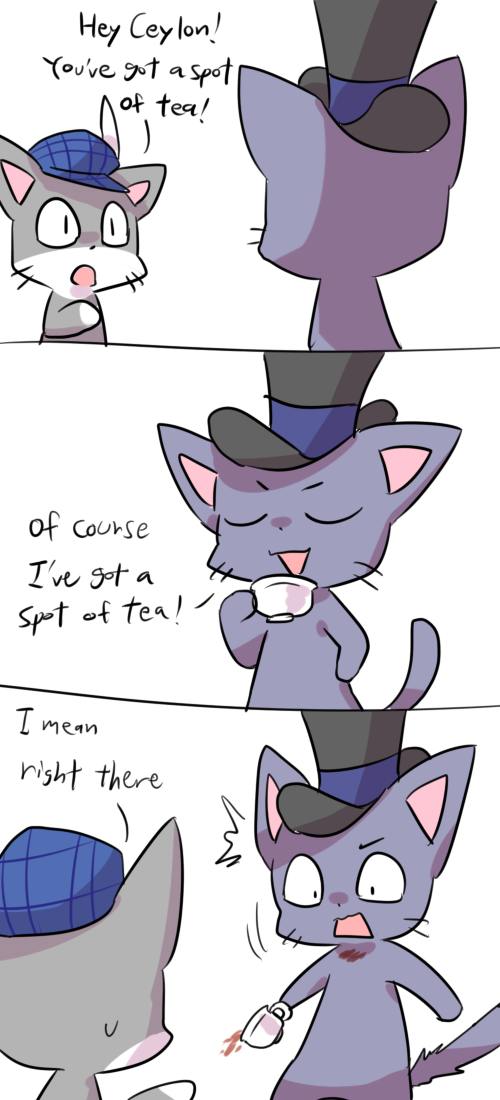
抱歉之前拖了這麼久都沒更新(沒梗的下場),來畫點圖吧!
之前介紹了跟咖啡有關的小知識,這次自然就要談談紅茶了~英國人喜歡紅茶,如何稱呼一杯紅茶也有不同的方法呢。雖然不少人會像美國人說"a cuppa"(也就是"a cuppa tea"),但是有一種比較少聽到的叫法是"a spot of tea"-也就是一小杯紅茶的意思
那麼為什麼這樣叫呢?在英式英文中,"spot"算是一種很古老的俗語,是很小量的意思。雖然這個用詞比較老派,但是有一些英文常用的俚語也會用到呢!除了前面提到的"a spot of tea",也會有"a spot of bother"用來形容一些小煩惱。
不過有時候"a spot of tea"會被美國人用來揶揄自己像英國人般喝茶的樣子…
說到紅茶文化,英國人喜歡紅茶的程度原來比想像中要大喔~有多大?英國流行使用電熱水壺(也就是快煮壺)來準備泡茶用的熱水,但是這些電熱水壺很吃電的。平時大家泡茶的時間都不同所以感覺不太明顯,但是如果很多人同一時間泡茶,整個國家的電力要求會一下子變得很大。
如何解決呢?原來英國有一些發電站是專門為了應付這些突然的大量電力需求而設,當中公司會要求那裡的員工留意電視播放的節目,目的就是猜測何時觀眾會集體想泡茶(例如劇集大結局之類)
你沒聽錯,英國人喝茶喝到要去興建專門的發電站。
最明顯的一次好像是1990年世界盃準決賽,英格蘭對西德那一場。原因嘛?嗯…你懂的。
Sorry for putting off updates for so long (writer’s block isn’t fun), but let’s have some doodling!
Since I’ve talked about coffee last time, I might as well talk about tea~It’s pretty well known that the British love their tea, and there are different ways to call a cup of tea too. Although most would simply call it “a cuppa" or “a cuppa tea" like how the Americans call their coffee, there’s a lesser known way to call a small cup of tea: “a spot of tea"
Where did this phrase come from? Back in the day, “spot" was used as a slang for “a small amount". Although this slang is pretty old (dating back to the 18th century), it still made its way into some common phrases in modern English. Aside from “a spot of tea" as previously mentioned, “a spot of bother" is also used to talk about small problems or annoyances.
Except sometimes “a spot of tea" is used by the Americans to joke about themselves drinking tea like a British…
Speaking of the British and their tea, their obsession with this brew turns out to be more serious than I could imagine. In the UK, most people boil water for their tea using electric kettles, but those kettles eat up quite a bit of electricity. This isn’t very noticible normally as people make their tea at different times, but when a lot of people put the kettle on at the same time, the whole country suddenly needs a lot of electricity. And fast.
How do you fix this? In the UK, there are power stations reserved just for sudden large power demands like those. They even have staff keeping an eye on the TV in order to guess when TV-watchers would all want a cuppa (finales of soap operas, for example)
You heard me right. The British love their tea so much they have to build power stations for it.
What’s the biggest example of this “TV pickup"? Apparently it’s the England vs West Germany match in the 1990 World Cup semifinals. Gee I wonder why…
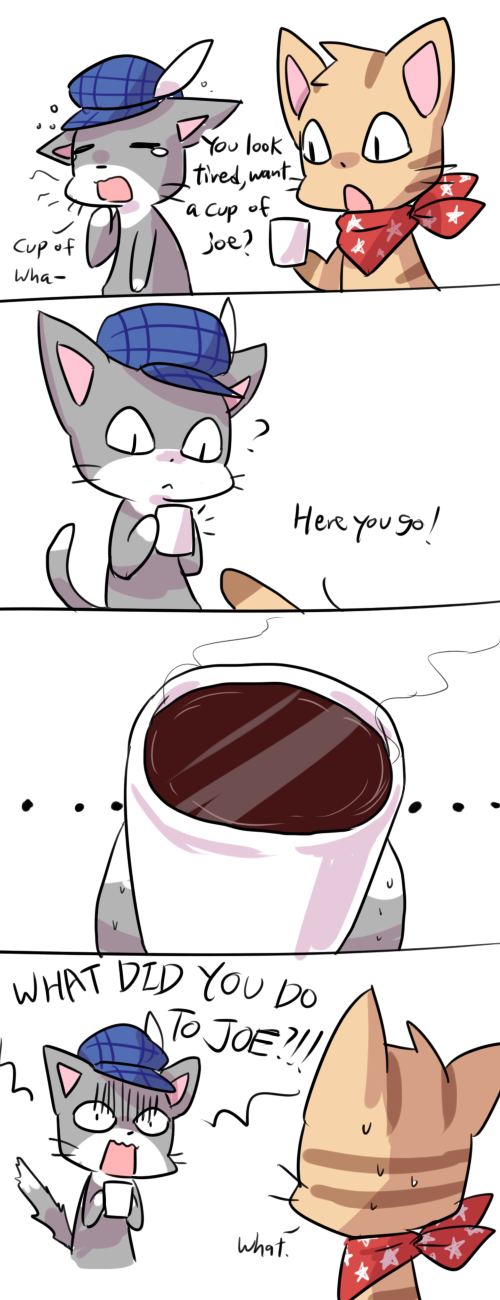
英國人喜歡紅茶是眾所周知的事情,相對地美國人比較喜歡咖啡的樣子(?)
咖啡的英文名當然就是coffee,但是在美國,咖啡有好幾種不同的別名喔!這裡用的a cup of joe,正正就是一杯咖啡的意思(再口語化一點就變成a cuppa joe了)
那麼為什麼會出現a cup of joe這個別稱呢?呃……好像連美國人自己也不太清楚的說(。
不過還是有幾種說法啦~其中一個比較多人講的就是某位美國海軍軍官下令禁酒,沒酒可喝的軍人們只好跑到喝咖啡。他們因為很不爽這位軍官,所以拿了他的名字當作咖啡的別稱順便暗婊他…聽起來很有道理,可惜好像已經被snopes流言終結了
另外一個說法是當年大部分咖啡豆是產至爪哇地區的,於是人們便用了爪哇Java作為咖啡的別稱(Java程式語言的LOGO是咖啡杯就是因為這個),然後Java加上Mocha就是Jamoke,簡稱就是Joe啦。好吧聽起來很扯,而事實上我自己也覺得很扯(喂
還有一個說法就是因為Joe在美國一直是普通老百姓,平民打工族的代名詞(普通人就是所謂的average joe),咖啡這麼平民的飲料自然就被稱為Joe了
哪種說法才是真的可能沒有人會知道,但是反正一直這樣叫也沒差了吧?
It’s a well-known fact that the British love their tea, meanwhile it seems that the Americans picked coffee as their national beverage (I think)
Coffee is obviously the name of this caffeine-laden, bitter-tasting liquid, but it actually has several nicknames in America! In this comic I used “a cup of joe" which means a cup of coffee. An even more casual way of saying it would be “a cuppa joe"
So where did this term even come from? Well…….looks like the Americans themselves aren’t very sure either. Still, there’s a few theories for that. One of the more popular theory is that back then there was this Navy officer who banned drinking alcohol on board. Since the sailors can’t get their booze, they resorted to drinking coffee. As a result, disgruntled sailors used the name of the officer, Joe, to refer to coffee as a way to insult him. Sure sounds plausible right? Too bad snopes already busted that myth.
Another idea is that people used to nickname coffee “Java" because back then most of the coffee beans in the marker are from Java (by the way, the coding language Java has a cup of coffee as its logo because of this nickname)
Apparently as people kept calling it “java", somehow it ended up morphing into “joe" by getting combined with “mocha" to form “jamoke". Yeah, sounds like a stretch. I kind of find it hard to believe either.
Some instead argued that because the term “joe" is used to describe common people and workers (an ordinary person is called an average joe, for example), naturally a down-to-earth drink like coffee would be given the name “joe" as well.
Maybe nobody really knows the truth behind “cup of joe", but people have used the nickname for decades anyways so I guess it doesn’t matter?
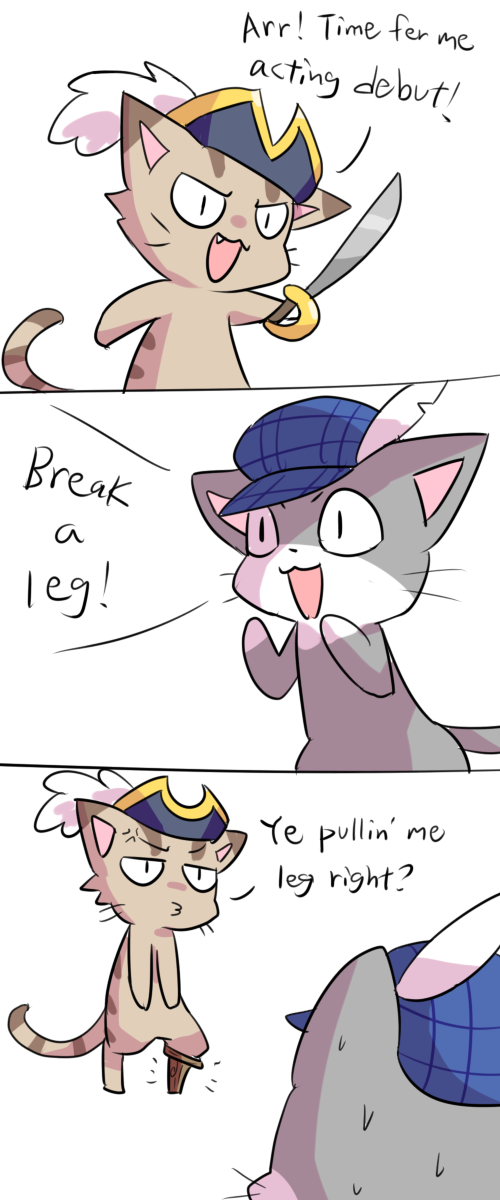
在戲劇組裡面,將要出場的演員經常會互相說Break a leg的
可能大家會覺得,這不對吧!怎麼會在這時候互相咀咒說希望人家跌斷腿的?
原來當年的戲劇組以迷信見稱,有不少戲劇組習俗都是由這些迷信開始的。對他們來講,出場前祝對方演出順利反而是不吉利的事情喔。
那麼要怎樣做才是吉利呢?自然就是說反話啦!說吉利的話會變得不吉利,說不吉利的話會變吉利好像也是摸基隆的事情(嗯?
經過這麼多年,Break a leg這個說法也變成了戲劇組的傳統呢~其實還有其他的有趣傳統的,大家可以找找看喔
然後漫畫中的最後一句對白又是什麼一回事?Pulling someone’s leg其實是指說話騙他們的意思,Are you pulling my leg?就是問別人是不是在開玩笑/胡說八道
另外也可以用Are you kidding me?表達同樣意思呢
“You’re pulling my leg, right" 就是"你騙我的對吧"這個意思,就只是語氣上的分別,嗯
Inside a theatre troupe, people often tell each other to “Break a leg" before they step out on stage. Perhaps you would wonder, that can’t be right? Why would they curse each other to fall and break their legs?
Turns out back in the day, theatre groups were well-known for being superstitious, and that often spawned all sorts of rituals. To these people, it was in fact unlucky to wish each other a good performance.
So what should they say for luck then? Why, the opposite, of course! If saying something lucky turns out to be unlucky, then obviously saying something unlucky will make it lucky right? (wait what)
As the years go by, the habit of telling each other to break a leg becomes one of the traditions of theatre. If you want to, there’s more interesting theatre traditions for you to discover!
On a side note, “pulling someone’s leg" means to lie to somebody. So to ask someone “Are you pulling my leg" means “Are you trying to fool me?"
Another way to ask the same thing would be “Are you kidding me?"